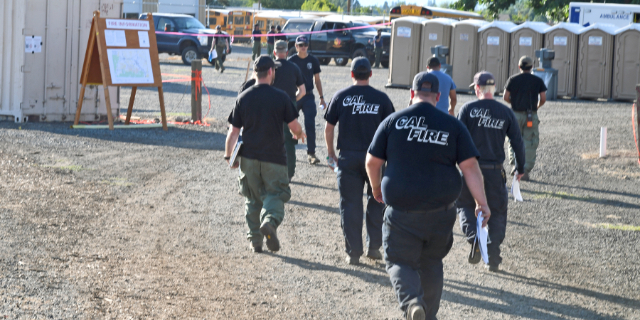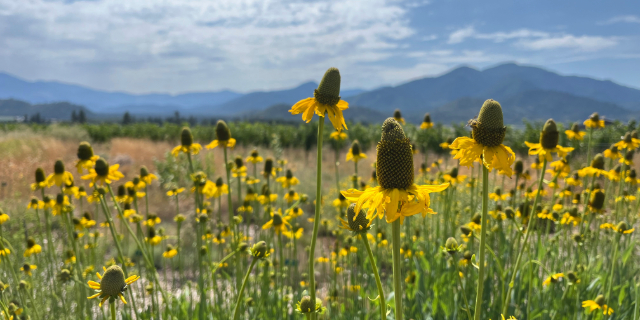Hope Village in Medford has fresh paint, new steps thanks to service group
Published 1:30 pm Monday, June 17, 2024

- David Nilson, a Rogue Valley resident who volunteers for several organizations, worked with the Piedmont Community Service Crew last week. Nilson helped build new steps for the 38 tiny homes at the Hope Village neighborhood off McAndrews Road in Medford.
Newly finished with the school year in Piedmont, California, a group of teens jumped into summer vacation by trekking north to the Rogue Valley for a week and a half of volunteer work.
Trending
Bryson Cheney, 17, took a water break Wednesday afternoon at Rogue Retreat’s Hope Village to assess the number of tiny houses already painted. Part of the Piedmont Community Service Crew (PCSC), the teen helped paint most of the 19 duplex-style structures and chipped in on building much-needed stairs and wheelchair ramps to improve access for residents.
For this second visit to the valley — the group spent 10 days in the area last summer — the teens and their leaders partnered with a local church and Rogue Retreat volunteers to spiff up the 7-year-old tiny homes.
Founded in 2017, Hope Village is a neighborhood of 8-foot-by-10-foot tiny homes that share a kitchen, restroom, laundry facilities and community areas, including a dog park and vegetable garden.
Trending
Seven years since the tiny home village first opened along McAndrews Road, new amenities were in order, Rogue Retreat marketing coordinator Benjamin McDonald said.
Between Wednesday and Friday, the weather-worn, jewel-colored structures were coated, one by one, in a soft, neutral paint. Plans call for a mural; various artists will collaborate on one continuous image stretching across the few dozen units.
“We’ve been working on stairs and ramps for a few of the houses. It’s stuff that our crew tends to do a lot of, and it’s good work,” Cheney said.
“We’ve spent a lot of time renovating houses in Oakland. We got out of school a week and a half ago and went right to work.”
Under the shade of a small tree, project facilitator Ken Li, who founded the group in 2003 as a co-ed community service branch of the Piedmont Council, Boy Scouts of America, smiled as he watched the group cutting wood and slathering paint on the tiny houses. Li said he was excited to bring his service group back to Southern Oregon.
Last year, the group built tiny houses at Rogue Retreat Crossings, Li said. Whether it involves building, painting or renovating tiny houses, providing shelter for the unhoused helps them “in a meaningful way,” he said.
Li said he chose to bring his club to the valley for the past two summers to help a former boss and longtime friend David Nilson, a local community volunteer and Rotarian.
Nilson, a retired engineering consultant, was working with the teens on-site Wednesday. He said he was impressed with the group’s progress. In addition to working on the tiny houses, they would also restore a horseshoe pit and cook for residents at The Kelly Shelter in Medford.
Nilson said community support was key to forging connections between community members from different walks of life and combatting homelessness.
“You see it in front of you every day and you just want to do something. I say, if you have something you like to do and something you’re good at, find a way to use it,” Nilson said.
“The kids — some of them really get into the construction, and some of them just want to paint. You try to play to their strengths and their interests.”
Elene O’Connell, the servce club president, said the service project in Medford was a fun opportunity. In addition to helping revamp the tiny houses, the group went kayaking and hiking and helped with a restoration project on a nature trail at Ashland’s Willow-Witt Ranch. The 16-year-old said she enjoyed traveling to different places to help.
“Piedmont is a pretty privileged place, so it’s good to expose ourselves to people from all different walks of life,” she said.
“It helps you realize everybody is really the same, and that we’re all just human, and we’re all just trying to, like, get through life.”
Cheney agreed.
“I think it’s honestly one of the best ways to solve not just the housing crisis or the crisis of people being unhoused,” Cheney said.
By meeting so many different kinds of people, he said, it’s easier to realize that many unhoused individuals are “really cool people with really interesting stories.”
“I was talking to a guy down at the shelter, when we were cooking … He had been a chef for years and years and had a really interesting life.
“I think it’s important to remember that any one thing can change somebody’s situation,” Cheney said. “The ability to humanize people is a first step, because it’s much easier to not help people when you don’t see them as fellow humans.”









